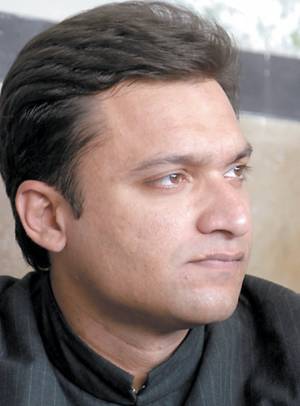Hyderabad, Jan 5: The Majlis-e-Ittehadul Muslimeen (MIM) sees a conspiracy by the Congress government in Andhra Pradesh to target its leader Akbaruddin Owaisi by slapping serious charges of waging war against the nation.
Police in Hyderabad, Adilabad and Nizamabad districts, during the last two days, registered three cases against Owaisi for allegedly making hate speeches last month.

However, the police in Nirmal town of Adilabad district went a step further and registered a case under Section 121 (waging or attempting to wage war against the state).
Police in Nizamabad also booked the MIM legislator under Section 295 A (for deliberate and malicious acts intended to outrage religious feelings).
The police Friday served notice to Owaisi, who is away in London for treatment, summoning him for questioning at Nirmal police station on Jan 8 and at Nizamabad on Jan 9.
The 42-year-old firebrand, younger brother of MIM chief and Member of Parliament Asaduddin Owaisi, faces arrest in the case.
However, sources in MIM said he is not likely to return to India before Jan 16. Owaisi, through his lawyers, may seek more time for appearing before the police.
"Akbar Owaisi is a public representative and not a hardcore criminal as the government is trying to project him," a leader of MIM told IANS while taking serious objection to Director General of Police V. Dinesh Reddy's statement that, if necessary, the police would take Interpol's help to arrest him.
Sources in MIM said Akbar would make himself available to police soon after his return to India and would cooperate with the due process of law.
While the young leader, who discontinued his medical education to enter politics in early 1990s, was booked many times for alleged provocative speeches in the past, this is the first time that a case of waging war or attempting to wage war has been registered against him.
Representing Chandrayangutta constituency in Hyderabad for the third consecutive term, Owaisi is also the leader of the MIM in the legislative assembly.
His alleged objectionable comments triggered an outcry from political opponents, who are demanding his disqualification as member of the legislative assembly; his opponents also seek that he be barred from contesting elections.
The MIM, which severed its ties with the Congress recently over the issue of expansion of a temple abutting historic Charminar, sees a conspiracy behind the cases.
A party leader, who did not want to be named, said Chief Minister Kiran Kumar Reddy was worried over the huge public response MIM was drawing at its public meetings in various towns.
"The chief minister says that the government has nothing to do with the cases, it is all his game plan to stop the MIM leader," he said, while referring to the police chief's statement that Owaisi may not be allowed to address public meetings in future.
Leaders MIM and some other Muslim groups under the banner of United Muslim Action Committee have been addressing meetings in towns with sizeable Muslim population to 'expose the Kiran Kumar Reddy government for colluding with communal forces'.
Unmindful of the controversy over Owaisi's remarks, the Muslim groups are holding a public meeting at Tandur in Ranga Reddy district Saturday night.
Sources in MIM also blamed some other rivals of the party and a section of electronic media for blowing the issue out of proportion. "There is nothing new in what he said. One should see the context in which the remarks were made," sources said.
MIM leaders are hopeful that serious charges under Section 121 would not stand in the court of law. They claim that Owaisi has said nothing which can be described as 'anti-national'.





Comments
Add new comment